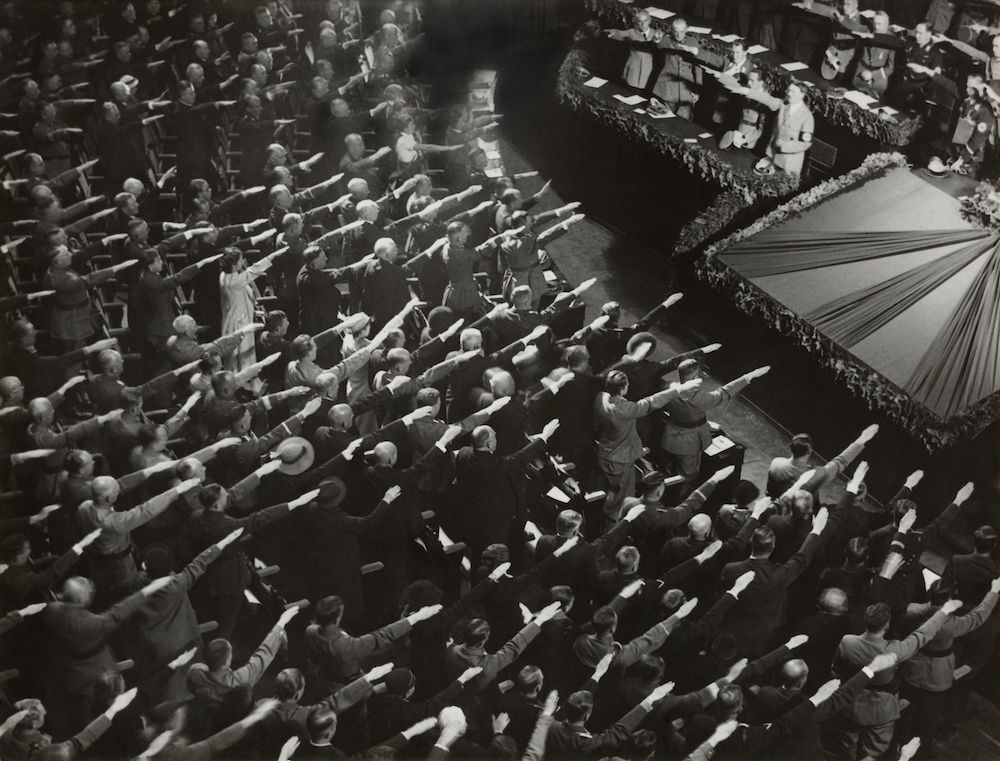
 Part IV of Louie Dean Valencia-García’s series The Rise of the European Far-Right in the Internet Age.
Part IV of Louie Dean Valencia-García’s series The Rise of the European Far-Right in the Internet Age.
In 2007, ITP’s website listed books by authors such as Italian traditionalist/fascist thinker, Julius Evola, far-right French nationalist and founder of the Action Française journal, Charles Maurras (1868-1952), and Michael O’Meara (b. 1946), author of New Culture, New Right: Anti-Liberalism in Postmodern Europe, amongst numerous other far-right authors. The website described itself as being “devoted to distributing and publishing books on traditionalism, metapolitics, initiation, esoterism[1] and the crisis of the modern world. We also carry books on the religious traditions of Europe and beyond, including the Indo-European, Christian and Islamic traditions.”[2]
From its beginning, ITP/Arktos heavily promoted the work of far-right philosopher Julius Evola, whose ideas were popular amongst fascist thinkers and in the press under Mussolini. Politically, Evola located himself to the right of fascism. Like many of his fascist contemporaries, Evola wanted to eschew modernity to restore an imagined, glorious past,[3] delving into a sort of occultism that obscured the rhetoric of his fascistic ideologies. In the wake of the Second World War, Evola’s ideologies became heavily coded as “traditionalism” as a means of survival in an intellectual world that no longer tolerated the xenophobia of fascism as it had during and prior to the Holocaust and the deaths of millions of people.
This coded far-right ideology was especially important for Evola’s philosophical survival given fascism’s disfavor in postwar Europe.[4] Today, Evola’s coded language has become useful for a European far-right living in a climate that until recently did not tolerate hate speech, having learned that toleration of intolerant hate speech, a form of violence in and of itself, only allows for more violent actions to escalate. Europeans, generally, had learned to tolerate intolerance was to become a bystander to hate.[5] This was a “paradox of tolerance,” describing how tolerating intolerance ultimately can ultimately only lead to intolerance writ large, was first elaborated by Viennese Jewish philosopher Karl Popper in his 1945 opus The Open Society and Its Enemies.[6]
In the second half of the twentieth century, the tragedy of the Holocaust became Europe’s rationale for a popular belief in the value of pluralism. Despite this new pluralism, Evola’s writing has continued to inspire far-right ideologues.[7] Today, the far-right fights for Evola’s idealized “traditional” past rooted in a pre-Enlightenment, imagined, homogenous idea of Europe—one that never was.[8] In fact, American white nationalist Richard Spencer has called Evola “one of the most fascinating men of the twentieth century.”[9] According to Mark Sedgwick, a professor studying traditionalism and esotericism at Aarhus University, the same university ITP/Arktos co-founder Christian Senholt attended, the Greek far-right party, Golden Dawn, lists Evola first on their recommended reading list.[10]
The publisher’s name, “Arktos,” recalls a Greek centaur, the Greek name for the bear in the constellation Ursa Major, and is the root of the word “artic”—recalling “Northerness.”[11] While many of the ITP/Arktos authors frame their ideologies not as explicitly fascist (in the pre–World War II sense of the term), many of the authors, such as Evola, certainly considered themselves fascistic, and even to the right of fascist ideology. Similar to how the Spanish Falange founder José Antonio Primo de Rivera was not strictly an Italian fascist, he certainly was a follower of Mussolini’s ideologies and held fascistic ideologies. ITP/Arktos’ authors and followers’ ideologies are inheritors of this fascist past, and in many ways are reanimating a sort of zombie fascism that avoids calling itself as such to avoid criticism, as virulent as ever—whether disguised as “the New Right” or the “Alt-Right,” the ideologies are contemporary iterations of fascism.
ITP/Arktos’ careful selection of authors often has skirted explicitly fascist ideologies (that is to say the books are often ideologically close to fascism, but not explicitly fascist avant la lettre). Like historical Nazi-Fascism, many of the works sold by ITP/Arktos positioned themselves as anti-modernist. The books sold and published by the company were either predecessors to fascism (Evola), or arose in the aftermath of the Second World War (the New Right), giving plausible deniability to their Nazi-Fascist roots—especially important given the sensitivity to Nazi-Fascist propaganda in most European countries. As Jean-Yves Camus and Nicolas Lebourg have demonstrated, the linage from the European New Right to early twentieth-century fascist ideology is clear.[12]
Meta-histories and Politics
Like how Nazi Germany looked to the pre-Weimar years, Spain’s Falange to its imperial past, and Italian Fascists to the fallen Roman empire, the works published by ITP/Arktos have looked toward an imagined past where Europe was “pure” to reconstruct an idealized future where a white ethno-state could exist—to accomplish this they use “metapolitics” to deconstruct what they see as a leftist cultural hegemony that has been in place since at least the post-World War II era. Jacques Marlaud (1944-2014), the former President of the Group de Recherches et d’Études pour la Civilisation Européenne (GRECE)—a French-based ethno-nationalist think tank founded in 1968 by philosopher and founder of the European “Nouvelle Droite” (New Right), Alain de Benoist (b. 1943), a dominant far right academic school of thought—defined their so-called metapolitics as “any work of reflection or analysis, any diffusion of ideas, any cultural practice liable to influence political society over the long term. It is no longer a matter of taking power but of providing those in power with ideological, philosophical, and cultural nourishment that can shape (or contradict) their decisions.”[13] This “metapolitics” posited a “third way” separate from a left/right binary—a new type of politics supposedly drawing from pre-Enlightenment thought. The New Right employs what Jean-Yves Camus and Nicolas Lebourg call “right wing Gramscism” to overturn the supposed liberal-leftist cultural hegemony.[14]
The word “fascist” can be a difficult one to negotiate, as much of the writing by followers of GRECE do not explicitly claim fascism; however, they certainly lend themselves to fascist tendencies.[15] Followers of GRECE have blamed liberalism (in the broadest sense of the word—including, but not limited to, democratic systems of governance based on the ideas of equality and pluralism) for the rejection of “traditional” beliefs—primarily scapegoating “cultural Marxism” for a decadent and degenerate modern worldview. While the New Right claims distain for “cultural Marxism,” they, too, draw on Marxist Antonio Gramsci’s theories of cultural hegemony—hoping to use Gramsci’s theoretical frameworks to flip what they see as the dominance of “cultural Marxism” in Western society today. This is partially due to the historical moment in which GRECE’s was founded—in the midst of Europe’s youth revolt, May ’68, and the Hippie “Summer of Love”—GRECE vilified leftist philosophical thinkers such as Herbert Marcuse (and the Frankfort School of Critical Theory), who taught a generation of influential leaders and scholars such as Angela Davis, Abbie Hoffman, and Kathy Acker. For GRECE, and its inheritor ideologues, such as the Identitarians, the May ’68ers are to blame for the rejection of traditionalism in Europe. They believe young people were seduced by the likes of French philosophers Marcuse and Guy Debord into believing in what they would probably call a degenerate worldview.
Arktos has even published the English language translation of one of Russian President Vladimir Putin’s advisors, the aforementioned Alexander Dugin—known for posting Islamophobic rants and videos that strongly support American president Donald Trump on YouTube.[16] In 2014, the self-proclaimed platform for the American Alt-Right,[17] Breitbart News, under the stewardship of Steve Bannon, called Dugin “Putin’s Rasputin.”[18] Bannon has even hinted at knowledge of Dugin’s esoteric-traditionalist inspiration, even citing Julius Evola in an interview.[19] Dugin sees himself as an inheritor of both the ideologies of GRECE and Evola. This was particularly surprising at the time due to Evola’s name recognition being primarily limited to followers of the New Right and scholars of fascism.
In fact, Arktos’ website even featured photos of Dugin at a meeting held with Arktos’ staff in India.[20] Dugin, a grizzled, bearded man that strikes a remarkable resemblance to the infamous mystic and advisor, Rasputin, has written numerous books published by Arktos, including: The Fourth Political Theory (2012), Eurasian Mission: An Introduction to Neo-Eurasianism (2014), Putin vs Putin: Vladimir Putin Viewed from the Right (2014), The Rise of the Fourth Political Theory (2017). Significantly, Dugin also wrote Martin Heidegger: The Philosophy of Another Beginning for Washington Summit Publishers (2014), the publishing arm of Richard Spencer’s National Policy Institute. In the work, Dugin explicitly connects his own philosophy to that of the Nazi philosopher.[21] To raise money to publish and translate Dugin’s work, Arktos has even launched a Kickstarter fundraiser.[22] Once published, these books are typically sold on the Arktos website and on the online retailer, Amazon. To be sure, while Dugin’s stage presence is lacking, the company has managed to find ways to promote him online, and to use the internet to crowdfund translations of his work.
As dire as all this sounds, while it might be obvious how influential the internet as a tool has become in helping to promote white-nationalist ideas, and although much has been written about the democratic potentialities of the Internet,[23] [24] we must remember Melvin Kranzberg’s first law of technology: “Technology is neither good nor bad; nor is it neutral.” [25] Kranzberg (1917-1995) believed his law “should constantly remind us that it is the historian’s duty to compare short-term versus long-term results, the utopian hopes versus the spotted actuality, the what-might-have been against what actually happened, and the trade-offs among various “goods”; and possible “bads.””[26] The founder of the Society for the History of Technology believed that the outcome of technology depended upon interactions between sociocultural situations and the values of societal institutions.[27]
Louie Dean Valencia-García, Ph.D. is an Assistant Professor of Digital History at Texas State University. He has taught in the Faculty of Arts and Sciences at Harvard University, and serves on the Research Editorial Committee for EuropeNow. His forthcoming book, Antiauthoritarian Youth Culture in Francoist Spain: Clashing with Fascism, will be published by Bloomsbury Academic in May 2018. He has held fellowships from the Andrew W. Mellon Foundation, the United States Library of Congress, the Spanish Ministry of Education, Culture and Sport, and Santander Universities, amongst others. This essay is part of a collection in-progress, Alt-Histories: Far-Right Revisionism and the End of History.
References:
[1] This esoterism can best be understood as a variation of occultism, promoting European pageanism, pre-Vatican II Catholicism, pre-Islamic pagan religion in what is today Iran, etc.
[2] Integral Tradition Publishing, archived July 30, 2008, http://web.archive.org/web/20080730045648/http://www.integraltradition.com:80/catalog/index.php.
[3] For Italian fascists, their idealized past was the Roman Empire, for the Nazis, a pre-Weimar Germany, and for the falangists in Spain, it was the Spanish Empire.
[4] For more on the occultism and fascism, see: Nicholas Goodrick-Clarke, The Occult Roots of Nazism: Secret Aryan Cults and Their Influence on Nazi Ideology (New York: NYU Press, 1993).
[5] This is a lesson that has yet to be fully understood in the United States, which clings to a version of free speech that doesn’t consider hate speech as dangerous as other violent types of verbal aggression such as threats of physical harm. When left to fester, the logical conclusion of violent hate speech is physical violence.
[6] Karl Raimund Popper, The Open Society and Its Enemies, trans. Ernst Hans Gombrich (Princeton: Princeton University Press, 2013), 581-2.
[7] See Jean-Yves Camus and Nicolas Lebourg, Far-Right Politics in Europe (Cambridge, MA: Belknap Press of Harvard University Press, 2017), 145-146.
[8] Many have demonstrated the ways that a genetically pure Europe never existed. This is seen in the work of Mark Lipson and David Reich, “Working Model of the Deep Relationships of Diverse Modern Human Genetic Lineages Outside of Africa | Molecular Biology and Evolution | Oxford Academic,” Oxford University Press Academic, January 12, 2017, accessed August 7, 2017, https://academic.oup.com/mbe/article/34/4/889/2838774/A-Working-Model-of-the-Deep-Relationships-of. White nationalists tend to conflate culture and genetic traits (race being a socially constructed thing), believing, ironiously, that culture is tied exclusively to an imagined purity of blood.
[9] Jason Horowitz, “Steve Bannon Cited Italian Thinker Who Inspired Fascists,” The New York Times, February 12, 2017, accessed May 15, 2017, https://www.nytimes.com/2017/02/10/world/europe/bannon-vatican-julius-evola-fascism.html.
[10] Mark Sedgwick, “Evola Poised to Enter Greek Parliament?” Traditionalists, May 3, 2012, archived May 23, 2012, https://web.archive.org/web/20120523202815/http://traditionalistblog.blogspot.com/2012/05/evola-poised-to-enter-greek-parliament.html.
[11] Nathan Leonard, “A Blaze through the Gloom; an Interview with Arktos Media’s John Morgan,” Heathen Harvest, July 07, 2014, accessed August 7, 2017, https://heathenharvest.org/2014/07/07/a-blaze-through-the-gloom-an-interview-with-arktos-medias-john-maorgan.
[12] See Jean-Yves Camus and Nicolas Lebourg, Far-Right Politics in Europe (Cambridge, MA: Belknap Press of Harvard University Press, 2017).
[13] Jean-Yves Camus and Nicolas Lebourg, Far-Right Politics in Europe (Cambridge, MA: Belknap Press of Harvard University Press, 2017), 120.
[14] Ibid., 121.
[15] I elaborate upon what I mean by “fascist tendencies” in part I of this series.
[16] Dugin’s Guideline – In Trump We Trust, prod. Katehon Think Tank, perf. Alexander Dugin, March 4, 2016, https://www.youtube.com/watch?v=aOWIoMtIvDQ.
[17] Sarah Posner, “How Donald Trump’s Campaign Chief Created an Online Haven for White Nationalists,” Mother Jones, June 23, 2017, accessed August 10, 2017, http://www.motherjones.com/politics/2016/08/stephen-bannon-donald-trump-alt-right-breitbart-news/.
[18] James Heiser, “Putin’s Rasputin: The Mad Mystic Who Inspired Russia’s Leader,” Breitbart, June 10, 2014, archived March 13, 2015, http://web.archive.org/web/20170102175703/http://www.breitbart.com/national-security/2014/06/10/putin-s-rasputin-the-mad-mystic-who-inspired-putin/.
[19] J. Lester Feder, “This is how Steve Bannon sees the entire world.”
[20] “About Arktos,” Arktos, accessed May 5, 2017, http://web.archive.org/web/20161011171050/http://arktos.com:80/about/.
[21] Heidegger’s writing has long been used by leftist academics from Hannah Arendt to Jean Paul Sartre to Michel Foucault for his study of being, used to understand postmodern thought, political theory, phenomenology, existentialism, etc. In his later work, Heidegger turned to pre-Socratic thought, creating fertile ground for the likes of the European New Right and Alt-Right, which also seeks a sort of primordial European identity.
[22] “Alexander Dugin and the Rise of The Multipolar World,” Kickstarter, accessed August 12, 2017, http://web.archive.org/web/20170812203838/https://www.kickstarter.com/projects/motpol/alexander-dugin-and-the-rise-of-the-multipolar-wor.
[23] One recent example of this is: Philip N. Howard and Muzammil M. Hussain, Democracy’s Fourth Wave?: Digital Media and the Arab Spring (Oxford: Oxford University Press, 2013).
[24] Manuel Castells’s Networks of Outrage and Hope: Social Movements in the Internet Age (Cambridge: Polity Press, 2015) work also highlights the potentiality of the Internet for promoting democracy.
[25] Melvin Kranzberg, “Technology and History: “Kranzberg’s Laws,”” Bulletin of Science, Technology & Society 15, no. 1 (1995)
[26] Ibid.
[27] Ibid.
Photo: Attendees give Hitler the Nazi salute during the nation anthem, Oct. 9, 1935. They were meeting at the Kroll Opera in Berlin, to organize the Winter Relief festive to help finance charitable work | Shutterstock
Published on February 19, 2018.




